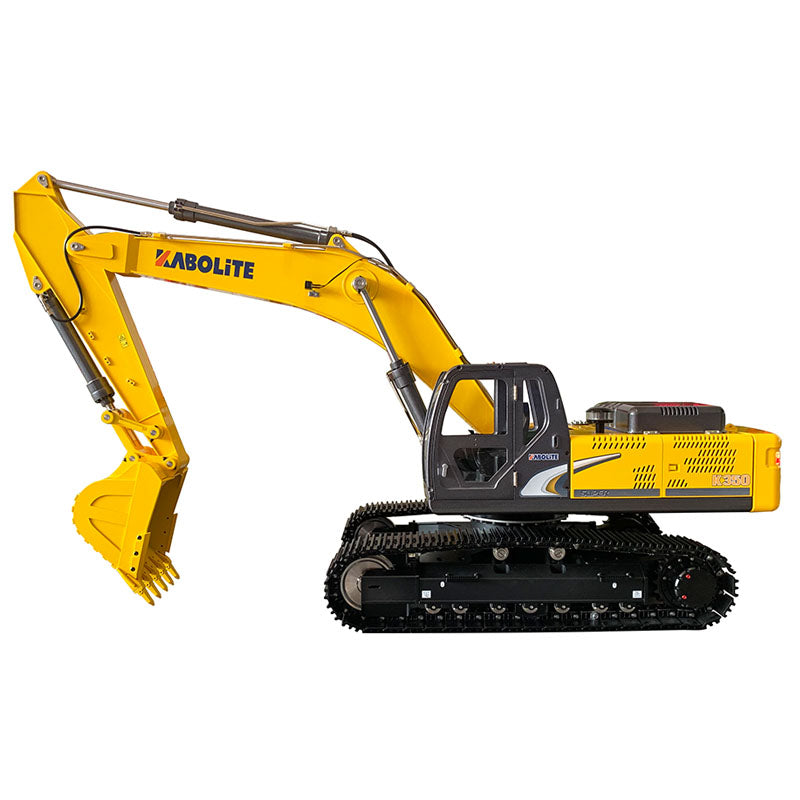Recognizing Exactly How Excavator Works and Its Effect on Performance
Excavators play an important duty in construction and mining operations, depending on a complex interplay of hydraulic and mechanical systems. Their ability to perform a range of tasks pivots on both their style and the technology incorporated within. Understanding these elements can greatly influence functional efficiency and efficiency. As advancements proceed to reshape the sector, one have to think about exactly how these changes will influence future practices and performance.
The Essentials of Excavator Mechanics

The Function of Hydraulic Solutions in Excavators
At the heart of excavator operation exists the hydraulic system, which plays a critical role in powering the maker's motions and features. This system makes use of pressurized hydraulic fluid to transfer energy, allowing numerous activities such as training, moving, and excavating. By using the concepts of hydraulics, excavators can execute tasks with exceptional precision and force, enhancing general operational efficiency.The hydraulic system includes vital components, consisting of pumps, valves, and cylinders, which interact to manage the flow and direction of the liquid. When the operator involves the controls, the hydraulic liquid is guided to specific cyndrical tubes, converting the operator's commands right into physical motion. This device enables receptive and smooth activities, which are necessary in construction and excavation atmospheres. double e volvo rc excavator. The effectiveness of the hydraulic system straight affects the productivity and flexibility of the excavator, making it a vital component in contemporary excavation processes
Key Elements of an Excavator
Recognizing the vital components of an excavator is essential for grasping how this powerful maker runs. An excavator consists of numerous substantial elements, including the undercarriage, house, container, arm, and boom. The undercarriage supplies stability and movement, commonly including tracks or wheels to browse different surfaces. Your home contains the engine and hydraulic systems, enabling the operator to regulate movement and power the device. The boom extends from your house, allowing upright reach, while the arm attaches to the bucket, facilitating digging and lifting operations.Additionally, the taxi houses the driver, outfitted with controls for specific handling. Each of these parts plays a crucial function in the excavator's total functionality, adding to its performance and performance on building and construction websites. Recognizing these parts assists in preserving and enhancing excavator efficiency, ensuring tasks are completed safely and effectively.
Accessory Convenience and Its Benefits
Add-on adaptability is a crucial aspect of excavators, allowing drivers to switch over between different devices customized for details tasks. This adaptability not only enhances work efficiency yet likewise adds to cost-effectiveness by decreasing the need for multiple makers. Recognizing the various kinds of attachments available can substantially impact the general performance and functionality of an excavator on task websites.
Sorts of Attachments
While excavators are mainly recognized for their excavating capabilities, their true flexibility hinges on the wide range of accessories available. These attachments enhance the excavator's capability, allowing it to perform various jobs beyond excavation. Common add-ons include buckets (for digging and scooping), hydraulic thumbs (for grasping products), and augers (for piercing holes) Grapples are utilized for relocating and taking care of debris, while rippers can separate hard surface areas. Various other specialized accessories, such as plates and plows, allow excavators to adapt to details work requirements. This diversity not only enhances the device's utility throughout different fields, including demolition, landscaping, and building and construction, but likewise permits drivers to customize their equipment to meet particular project demands effectively.
Raised Task Performance
Making best use of task performance is a key advantage of making use of numerous excavator attachments. Various attachments permit an excavator to perform numerous jobs without requiring to switch over equipment, saving useful time and labor. For example, utilizing a hydraulic hammer can break concrete while a container accessory can excavate dirt, enabling a seamless operations. This adaptability minimizes downtime related to devices changes and boosts productivity on-site. In addition, specialized add-ons improve precision in jobs such as grading or landscape design, causing greater high quality end results. The capability to adapt to numerous job demands not only improves procedures but additionally lessens the requirement for additional equipment, making certain that jobs are finished promptly and efficiently. Generally, attachment adaptability significantly adds to enhanced work efficiency in excavation job.
Cost-Effectiveness and Versatility
Cost-effectiveness is a substantial benefit of making use of versatile excavator attachments. These my explanation add-ons enable a single excavator to do multiple jobs, reducing the demand for added equipment and labor - double e volvo rc excavator. By switching in between containers, hammers, and grapples, operators can take on different projects, from excavating to demolition, thereby taking full advantage of equipment application. This flexibility not just lowers operational prices yet additionally decreases downtime connected with altering devices. Additionally, the capacity to customize excavators with specialized attachments improves performance, as they can successfully manage varied tasks according to task needs. In conclusion, the combination of cost-effectiveness and adaptability in excavator attachments adds to boosted functional performance and source allocation in construction and excavation jobs

Advanced Innovation in Modern Excavators
Modern excavators are progressively outfitted with innovative technology that transforms excavation procedures. Automation improves procedures, while enhanced fuel performance reduces functional expenses. Additionally, smart control systems improve accuracy and security, marking a considerable development in excavation devices.
Automation in Excavation Processes
As excavation modern technology progresses, automation has actually become a crucial element in enhancing performance and accuracy on task websites. Modern excavators are outfitted with advanced automated systems that promote jobs such as grading, excavating, and trenching with minimal operator intervention. These systems utilize sensors, GPS, and maker understanding formulas to assure exact positioning and depth control, significantly decreasing the margin for error. Additionally, automation permits operators to focus on critical decision-making as opposed to manual controls, causing improved performance overall. Such developments not only streamline operations however likewise boost security by lessening human mistake in complicated procedures. Consequently, the assimilation of automation in excavation procedures stands for a substantial advancement in construction innovation, driving the market towards better performance and effectiveness.
Boosted Fuel Efficiency
Improvements in innovation have actually likewise brought about substantial enhancements in fuel performance for modern excavators. Modern machines are outfitted with innovative engines that maximize power output while minimizing fuel intake. These engines utilize cutting-edge combustion modern technologies, such as turbocharging and direct fuel injection, to boost efficiency and efficiency. Additionally, light-weight materials in building and construction reduce total weight, allowing for less energy expenditure during procedure. The introduction of variable speed controls allows operators to adjust engine efficiency according to certain jobs, even more decreasing gas use. Consequently, these improvements not only reduced functional expenses yet additionally contribute to ecological sustainability by reducing emissions. In general, enhanced fuel performance in excavators is a crucial development that boosts performance and financial stability in the building industry.
Smart Control Equipment
While drivers navigate progressively complex task websites, wise control systems in excavators have actually emerged as important tools for improving effectiveness and accuracy. These innovative modern technologies utilize sensors and algorithms to keep an eye on different criteria such as load weight, terrain problems, and functional efficiency. By instantly adjusting hydraulic functions, wise systems optimize equipment efficiency, bring about improved productivity and lowered wear on parts. Furthermore, drivers take advantage of intuitive user interfaces that provide real-time responses and diagnostics, enabling for educated decision-making. This integration of modern technology not only streamlines procedures but additionally minimizes human mistake, adding to safer workplace. As the construction industry remains to progress, clever control systems will play a crucial duty fit the future of excavator efficiency and effectiveness.
Enhancing Operational Performance With Excavators
Excavators play an important role in improving operational performance across various building and excavation jobs. Their adaptability enables several jobs, including product, digging, and lifting handling, which improves operations and lowers the need for additional tools. With effective hydraulic systems, excavators can execute sturdy tasks with accuracy, considerably lowering the time needed to full projects. The assimilation of innovative modern technology, such as GPS and automated controls, further optimizes their operation, enabling operators to attain higher accuracy and decrease product waste. In addition, modern excavators are made to consume less fuel and reduce discharges, adding to both expense savings and environmental sustainability. By utilizing excavators effectively, building teams can enhance productivity, satisfy task deadlines, and improve overall site administration. This multifunctionality and efficiency make excavators crucial devices in the modern-day building and construction landscape.
The Future of Excavators in Construction and Mining Industries
As the building and construction and mining markets progress, the future of excavators is positioned for considerable transformation driven by technical technology you can look here and changing functional needs. Advances in automation and man-made intelligence are improving excavator capacities, permitting improved precision and efficiency in operations. Autonomous excavators are emerging, decreasing the demand for human treatment and decreasing the risk of accidents.Moreover, the integration of telematics and IoT technology makes it possible for real-time surveillance of equipment performance and anticipating maintenance, enhancing uptime. Environmentally friendly layouts, including electrical and hybrid designs, are obtaining grip, aligning with sustainability objectives within the industry.Additionally, using sophisticated materials and lighter designs enhances gas performance while keeping efficiency standards. As these fads progression, excavators will certainly play an important role in fulfilling the increasing needs for productivity and safety and security in construction and mining, eventually changing functional landscapes.
Frequently Asked Concerns
Just How Do Weather Impact Excavator Performance?

Climate conditions considerably influence excavator efficiency, as rain and mud can impede traction and stability, while extreme temperatures might influence hydraulic systems. Operators needs to adapt to these variables to assure perfect capability and safety throughout operations.
What Safety Actions Should Operators Follow While Utilizing Excavators?
Security procedures for excavator operators include putting on suitable personal protective devices, carrying out pre-operation inspections, guaranteeing correct interaction with ground employees, preserving a safe range from overhanging dangers, and adhering to well-known operational procedures to protect against mishaps.
Exactly How Typically Should Excavators Be Preserved for Ideal Efficiency?
Excavators ought to be preserved regularly to ensure peak efficiency, generally every 250 operating hours or as specified by the producer. Routine checks enhance reliability, stop unexpected failures, and extend the life-span of the equipment.
What Is the Average Lifespan of an Excavator?
The ordinary lifespan of an excavator normally ranges from 10,000 to 15,000 hours of procedure. Aspects affecting long life include upkeep methods, running conditions, and the high quality of the equipment itself, impacting total performance and performance.

Can Excavators Operate Uneven Surface Effectively?
Excavators can run efficiently on uneven surface due to their expressed layouts and adjustable tracks. These features enable them to keep security and grip, making it possible for reliable operation in difficult environments commonly experienced in building and landscape design projects. Each of these elements plays a crucial these details function in the excavator's general functionality, adding to its performance and performance on building and construction websites. Maximizing job effectiveness is a primary advantage of using various excavator add-ons. While drivers browse increasingly intricate work sites, wise control systems in excavators have actually arised as necessary tools for boosting performance and accuracy. Excavators play an important function in boosting operational effectiveness across various building and construction and excavation jobs. Breakthroughs in automation and synthetic knowledge are improving excavator capacities, permitting for boosted precision and performance in operations.